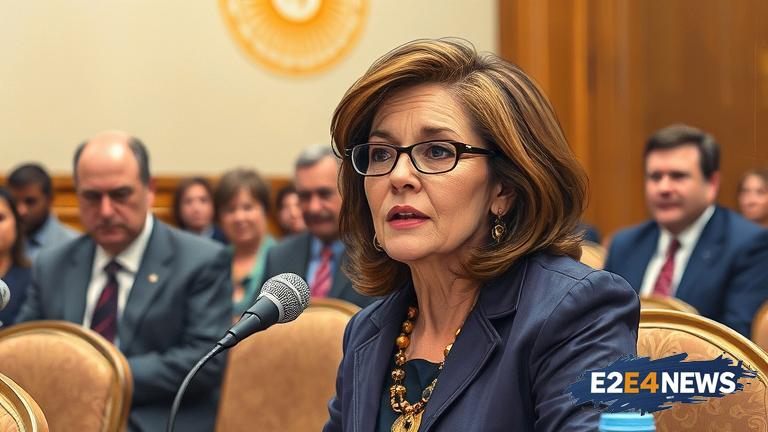A subcommittee has decided not to impose sanctions on New Mexico Senator Mimi Stewart, a move that has been met with both relief and criticism from lawmakers. The decision was made after a thorough review of the allegations against Stewart, who has been a prominent figure in the New Mexico Senate. The subcommittee’s recommendation is a significant development in the ongoing saga surrounding Stewart, who has been accused of misconduct. Despite the allegations, the subcommittee found that there was insufficient evidence to warrant sanctions. The decision has been praised by Stewart’s supporters, who argue that she has been unfairly targeted by her opponents. However, not everyone is pleased with the outcome, with some lawmakers expressing disappointment and frustration. The leader of the Republican Party in the New Mexico Senate has panned the decision, arguing that it sets a bad precedent. The controversy surrounding Stewart has been ongoing for several months, with some lawmakers calling for her to be censured or even expelled from the Senate. The allegations against Stewart are complex and multifaceted, involving claims of misconduct and unethical behavior. Despite the seriousness of the allegations, the subcommittee ultimately decided that there was not enough evidence to support sanctions. The decision is likely to be seen as a victory for Stewart, who has maintained her innocence throughout the ordeal. However, it is also likely to be met with skepticism by some lawmakers, who may feel that the subcommittee was too lenient. The controversy surrounding Stewart has highlighted the deep divisions within the New Mexico Senate, with some lawmakers sharply critical of her actions. The subcommittee’s decision is also likely to have implications for the broader political landscape in New Mexico, where the Republican Party has been seeking to gain traction. The decision has been seen as a setback for the GOP, which had been hoping to use the controversy to its advantage. Despite this, the party’s leader has vowed to continue pushing for accountability and transparency in the Senate. The controversy surrounding Stewart has also raised questions about the effectiveness of the Senate’s ethics procedures, with some lawmakers arguing that the system is flawed. The subcommittee’s decision has been seen as a test of the Senate’s ability to police itself, with some lawmakers arguing that it has failed to take adequate action. The decision is likely to be the subject of ongoing debate and discussion in the coming weeks and months, with some lawmakers calling for further action to be taken. The controversy surrounding Stewart has also highlighted the importance of transparency and accountability in government, with some lawmakers arguing that the public has a right to know about the actions of its elected officials. The subcommittee’s decision has been seen as a step in the right direction, but some lawmakers argue that more needs to be done to ensure that the Senate is operating in a transparent and accountable manner. The decision has also raised questions about the role of the subcommittee in the Senate’s ethics procedures, with some lawmakers arguing that it should play a more prominent role in investigating allegations of misconduct. The controversy surrounding Stewart has been a major distraction for the Senate, which has been struggling to pass key legislation in recent months. The subcommittee’s decision is likely to be seen as a welcome development by some lawmakers, who are eager to move on from the controversy and focus on more pressing issues. However, others may see it as a missed opportunity to address the underlying issues that led to the allegations against Stewart. The decision has also highlighted the challenges of investigating allegations of misconduct in the Senate, where lawmakers are often reluctant to speak out against their colleagues. The subcommittee’s decision has been seen as a reflection of the difficulties of navigating the complex web of relationships and alliances within the Senate. The controversy surrounding Stewart has also raised questions about the impact of partisanship on the Senate’s ethics procedures, with some lawmakers arguing that the system is too politicized. The subcommittee’s decision has been seen as a attempt to rise above the partisan fray and make a decision based on the evidence, but some lawmakers argue that it has been influenced by political considerations. The decision has also highlighted the importance of finding a balance between accountability and fairness in the Senate’s ethics procedures, with some lawmakers arguing that the system needs to be reformed to ensure that it is working effectively. The controversy surrounding Stewart has been a major test of the Senate’s ability to govern itself, with some lawmakers arguing that it has failed to meet the challenge. The subcommittee’s decision is likely to be seen as a significant development in the ongoing saga surrounding Stewart, but it is also likely to be the subject of ongoing debate and discussion in the coming weeks and months.
